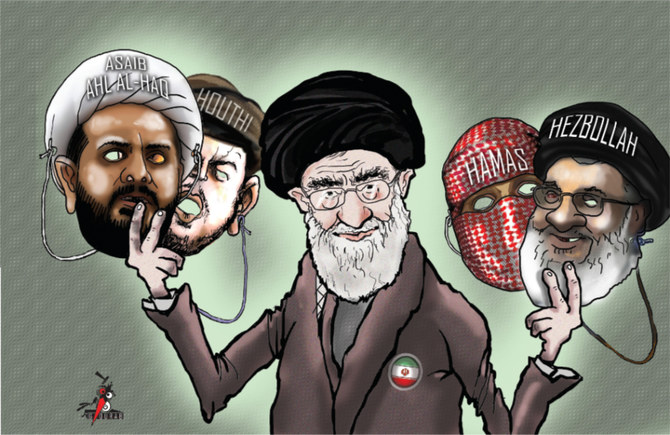د / ماجد رفي زاده: يجب على العالم أن يواجه إيران على خلفية ما تقوم به من اغتيالات خارج حدودها وفي بلدان متعددة
World must stand up to Iran over its extraterritorial assassinations
Dr. Majid Rafizadeh/Arab News/February 17/2022
One of the core strategies of the Iranian regime is carrying out assassinations abroad to advance its revolutionary ideals and parochial interests. For example, Turkish and Israeli intelligence forces recently cooperated and were able to foil an assassination attempt on Istanbul-based Israeli businessman Yair Geller. It was reported last week that an Iranian cell, which consisted of nine individuals and was run by Iran-based intelligence officer Yassin Tahermkandi and his Turkish counterpart Saleh Mushtag Bhighus, had targeted Geller, who supplies machinery for the automotive, aerospace and medical industries.
This is not the first time the Iranian regime has attempted to carry out an assassination in Turkey. In fact, Turkey has become an important hub for Tehran to target foreign citizens or dissidents. The Turkish authorities last year detained Mohammed Reza Naderzadeh, an employee at the Iranian Consulate in Istanbul, for his role in the killing of critic Masoud Molavi Vardanjani in November 2019. The accused allegedly forged travel documents for Ali Esfandiari, who orchestrated the assassination.
The regime reportedly targeted Vardanjani due to his social media campaign, which was aimed at exposing corruption in the Islamic Revolutionary Guard Corps, the Quds Force and the theocratic establishment. He had defected after serving as an intelligence officer for the Iranian government and wrote on social media: “I will root out the corrupt mafia commanders… Pray that they don’t kill me before I do this.”
In 2017, Saeed Karimian, a British television executive who founded Gem TV, which runs 17 Persian-language channels, was shot dead in Istanbul. Before his killing, he was convicted in absentia in Iran for spreading propaganda against the regime.
Such assassination orders likely come from the very top of the theocratic establishment. As a senior US official pointed out: “Given Iran’s history of targeted assassinations of Iranian dissidents and the methods used in Turkey, the United States government believes that Iran’s Ministry of Intelligence and Security was directly involved in Vardanjani’s killing.”
The Iranian regime also targets foreign political leaders and diplomats whom it opposes. It is known to have “target packages” containing information on foreign citizens or residents who are human rights defenders, critics of the Iranian leaders, political activists or dissidents. Some of the regime’s targets are politicians or diplomats from those countries that Iran views as rivals. For instance, in a well-known case, two Iranian nationals were convicted in the US of plotting to assassinate Saudi Ambassador Adel Al-Jubeir at a restaurant in Washington in 2011.
Tehran’s assassination attempts can also be traced to Europe. Regime diplomat Assadollah Assadi was last year sentenced to 20 years in jail in Belgium over his role in a 2018 terrorist plot. Assadi delivered explosive material to his accomplices with the aim of bombing an Iranian opposition rally in Paris, which I attended. Had the plot not been discovered at the very last minute, hundreds of people could have been killed, including international dignitaries and many European parliamentarians. Countries such as Turkey should expel Iranian ‘diplomats’ and intelligence agents, who may be plotting further terrorist attacks.
Another agent of the regime, Mohammed Davoudzadeh Loloei, was in 2020 sentenced to prison by a Danish court for being an accessory to the attempted murder of one or more opponents of the Iranian regime.
In order to halt the regime’s assassinations, the international community must hold the regime accountable for its terror activities. Countries such as Turkey should adopt firm policies and even pass legislation to allow them to expel Iranian “diplomats” and intelligence agents, who may be plotting further terrorist attacks. They should also consider closing down Iranian embassies until Tehran halts its terror activities. And, most importantly, they need to designate the IRGC and its proxies as terrorist organizations.
Any country that appeases the Iranian regime is making itself more vulnerable to its terror activities and assassinations. Since the establishment of the regime in 1979, it has been the modus operandi of the Iranian regime to use the territories of countries it has good relationships with to export its revolutionary principles and assassinate foreign citizens, human rights defenders and dissidents. When a foreign government pursues appeasement policies toward Tehran, it opens the door for the regime to exploit it and pursue its hard-line agenda inside that country’s borders.
The latest developments clearly show that Ankara’s close relationship with the regime has emboldened and empowered Tehran to plot assassinations on Turkish soil. The Tehran regime must be held accountable for its frequent assassination plots on foreign soil, which ought to be considered a blatant breach of state sovereignty.
*Dr. Majid Rafizadeh is a Harvard-educated Iranian-American political scientist. Twitter: @Dr_Rafizadeh






















